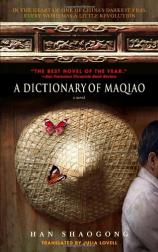Reading Group Guide
Discussion Questions
A Dictionary of Maqiao

1. How were you affected by the novel's dictionary format? How did the entries differ from traditional chapters in a novel, or short stories in a collection? What does the narrator have to say about traditional fiction, with one protagonist climbing a standard narrative arc?
2. What do the anecdotes about Long Stick Xi in "Rough" illustrate about the villagers' reaction to outsiders and to elixirs?
3. In his entry for "Little Big Brother (etc.)" Han writes, "A linguistic space will always be distorted under the influence of a particular set of beliefs." What does this section express about the power of language to diminish respect for women? What is your opinion of the Revolution's reasoning in expunging professional titles, from Ph.D. to artist?
4. "House of Immortals (and Lazybones)" provides information about full-form Chinese characters, especially the picto-phonetic type. What are your impressions of this form of written communication? What benefits and limitations does it possess, especially compared to the use of an alphabet? How would these traits affect the translator's experience?
5. Han observes that only humans suffer from "streetsickness;" dogs and other nonverbal creatures are immune. He then deduces that language must be part of the culprit: "Language becomes prophecy, a mass hysteria that confuses true and false." Would humanity be better off without language?
6. The showdown between Benyi and Three Ears, escalating in "Rude (continued)" and "Nailed Backs," culminates in Tiexiang's elopement. What does this portion of the book convey about the codes of acceptable behavior, punishment, and morality in general in Maqiao? How do the villagers feel about love? What accounts for the "linguistic blanks" mentioned in "Riding a Wheelbarrow"?
7. What sort of portrait is created by the list of entries itself? What is the significance of the categories of words, from ""Floating Soul" to "Taiwan," that would need clarification for a visitor to this community?
8. During his exile, the narrator becomes an informal anthropologist. From that perspective, what does A Dictionary of Maqiao say about the rituals and norms of the villagers? Are they so removed from those of the narrator? What roles do nature, nurture, history, and politics play in shaping the beliefs of any population? Why does the Cultural Revolution cause Han to have an essentially immigrant experience within his own country?
9. Discuss the ironies in the listing for "Tiananmen." How did your associations with Tiananmen Square compare to the more obscure destination in this listing?
10. "Democracy Cell (As Used by Convicts)" describes Kuiyuan's deplorable experience in jail, where the prison king's subordinates were referred to as Daoist Immortals. How does true Daoism influence the actions of the villagers? What does the narrator theorize in "Kuiyuan" about the ineffectiveness of religion in spurring kindness throughout history?
11. "Separated-Pot Brothers" features the narrator's reunion with Ma Ming, who by that time no longer lives in the House of Immortals. What other changes have occurred in their twenty years apart? What could world leaders learn from the fate of Maqiao?
12. What does Uncle Luo, a confirmed bachelor who could recall the days before land reform, prove or disprove about the Revolution's reverence for peasants? Under different circumstances, could he have become an Educated Youth? What might the true destiny have been for other characters in the novel?
13. What storytelling devices does the author use to balance humor with the many tragedies occurring in Maqiao? How does he balance logic with absurdity, and supernatural events with realism? How would censorship affect the storytelling paths an author chooses, especially when capturing a painful chapter of political history? Is A Dictionary of Maqiao a satire?
14. What did this novel help you discover about the history of Communism in China? Can such an economic system exist outside the context of oppression despite its promise to protect the working class from oppression?
15. Dialect is one of the ways the people of Maqiao maintain their distinct identity. What dialects are associated with your ancestry? What do those lexicons and pronunciations reveal about your family history?
A Dictionary of Maqiao
- Publication Date: September 27, 2005
- Paperback: 416 pages
- Publisher: Dial Press Trade Paperback
- ISBN-10: 0385339356
- ISBN-13: 9780385339353






